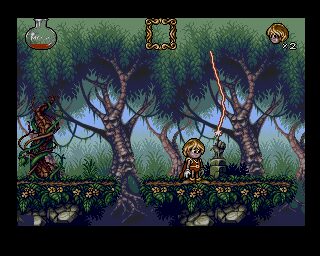Disney's The Little Mermaid for the NES is a side-scrolling action game loosely based on the 1989 animated film. It was developed by Capcom and released in 1990.
At the time, Capcom, after the success of Mega Man, had already earned a reputation for delivering high-quality licensed games for the NES, including titles based on other Disney properties like Disney's DuckTales and Chip 'n Dale: Rescue Rangers. This game followed in those footsteps, albeit with a lighter tone and easier difficulty aimed at younger audiences.
In the game, players control Ariel as she swims through underwater levels filled with hostile sea creatures and obstacles. Instead of jumping or attacking in traditional platformer fashion, Ariel uses her tail to trap enemies in bubbles and then hurls them as projectiles—a mechanic that feels a bit like a watered-down version of Bubble Bobble. Levels are short but diverse, including areas such as sunken ships, sea caves, and Ursula’s lair. Each stage ends with a boss fight, and while these are simple, they provide some variety to the gameplay.
Visually, the game is vibrant for an NES title, with colorful sprites and fluid animation. The music is cheerful and matches the Disney tone, even if it doesn't directly use songs from the film. CAPCOM’s polish is evident throughout the presentation, although the game’s brevity and low difficulty make it more suitable for casual or younger players than for seasoned platforming fans.
A port to the Game Boy was released later, retaining the basic structure but with obvious graphical compromises. While the charm remained, the limited hardware affected the visuals and sound quality, making the NES version the more enjoyable of the two.
Overall, Disney's The Little Mermaid is a solid licensed platformer that, while not particularly ambitious, offers a short and pleasant underwater adventure. It's much more pleasant than the Genesis Ariel game created by Blue Sky, called Ariel the Little Mermaid. This NES game is much better and it stands as a reminder of how Capcom could take even a gentle, non-violent license and turn it into a competent and appealing video game.














